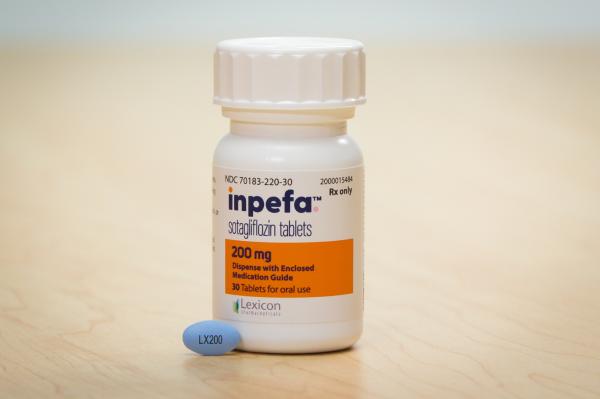Sotagliflozin
Generic name: sotagliflozin [ SOE-ta-gli-FLOE-zin ]
Brand name: Inpefa
Dosage form: oral tablet (200 mg; 400 mg)
Drug class: Miscellaneous cardiovascular agents
What is sotagliflozin?
Sotagliflozin is used in adults to lower the risk of death from heart attack, stroke, or heart failure with type 2 diabetes with kidney disease who also have heart disease.
Sotagliflozin is also used in adults to lower the risk of dying or needing to be in a hospital for heart failure when your heart cannot pump blood properly.
Sotagliflozin may also be used for purposes not listed in this medication guide.
Sotagliflozin side effects
Get emergency medical help if you have signs of an allergic reaction: hives; difficult breathing; swelling of your face, lips, tongue, or throat.
Stop taking sotagliflozin and call your doctor right away if you have symptoms of a serious side effect, such as stomach pain, nausea, vomiting, tiredness, or trouble breathing.
Seek medical attention right away if you have signs of a genital infection (penis or vagina): burning, itching, odor, discharge, pain, tenderness, redness or swelling of the genital or rectal area, fever, not feeling well. These symptoms may get worse quickly.
This medicine can cause serious side effects, including:
-
pain in your side or lower back, painful urination, blood in your urine, painful or difficult urination;
-
fever, nausea, vomiting; or
-
low blood sugar--headache, hunger, sweating, irritability, dizziness, fast heart rate, and feeling anxious or shaky.
Common side effects of sotagliflozin may include:
-
pain and burning when you urinate;
-
low blood sugar;
-
dehydration; or
This is not a complete list of side effects and others may occur. Call your doctor for medical advice about side effects. You may report side effects to FDA at 1-800-FDA-1088.
Warnings
Use only as directed. Tell your doctor if you use other medicines or have other medical conditions or allergies.
Sotagliflozin can cause serious infections around the penis or vagina. Get medical help right away if you have burning, itching, odor, discharge, pain, tenderness, redness or swelling of the genital or rectal area, fever, or if you don't feel well.
Stop taking this medicine and call your doctor right away if you have symptoms of a serious side effect, such as stomach pain, nausea, vomiting, tiredness, or trouble breathing.
Tell your doctor if you are sick with vomiting or diarrhea, or if you eat or drink less than usual.
Before taking this medicine
You should not use sotagliflozin if you are allergic to it.
Tell your doctor if you have or have ever had:
-
type I diabetes or diabetic ketoacidosis;
-
pancreas disorder, including surgery;
-
a habit of drinking more than 3 alcoholic beverages per day;
-
a genital infection (penis or vagina);
-
a bladder infection or urination problems; or
-
liver or kidney disease.
Stop using sotagliflozin and tell your doctor right away if you become pregnant. Sotagliflozin can cause injury or death to the unborn baby if you use the medicine during your second or third trimester.
Do not breastfeed.
How should I take sotagliflozin?
Follow all directions on your prescription label and read all medication guides or instruction sheets. Use the medicine exactly as directed.
Sotagliflozin is usually taken once per day on an empty stomach, at least 1 hour before the first meal of the day.
If you need surgery, tell the surgeon ahead of time that you are using sotagliflozin. You may need to stop using the medicine for a short time.
Your blood will be tested before and during treatment with sotagliflozin.
This medicine can affect the results of certain medical tests. Tell any doctor who treats you that you are using sotagliflozin.
Swallow the tablet whole and do not crush, chew, or break it.
Store at room temperature away from moisture and heat.
What happens if I miss a dose?
Use the medicine as soon as you can, but skip the missed dose if you are more than 6 hours late for the dose. Do not use two doses at one time.
What happens if I overdose?
Seek emergency medical attention or call the Poison Help line at 1-800-222-1222.
What should I avoid while taking sotagliflozin?
Follow your doctor's instructions about any restrictions on food, beverages, or activity.
Avoid getting up too fast from a sitting or lying position, or you may feel dizzy.
What other drugs will affect sotagliflozin?
Tell your doctor about all your other medicines, especially rifampicin.
Many drugs can affect your blood sugar and may also affect sotagliflozin. This includes prescription and over-the-counter medicines, vitamins, and herbal products. Tell your doctor about all other medicines you use. Not all possible interactions are listed here.
More about sotagliflozin
- Check interactions
- Compare alternatives
- Side effects
- Dosage information
- During pregnancy
- Drug class: miscellaneous cardiovascular agents
- En español
Patient resources
Other brands
Professional resources
Other brands
Related treatment guides
Further information
Remember, keep this and all other medicines out of the reach of children, never share your medicines with others, and use this medication only for the indication prescribed.
Always consult your healthcare provider to ensure the information displayed on this page applies to your personal circumstances.
Copyright 1996-2024 Cerner Multum, Inc. Version: 1.01.

